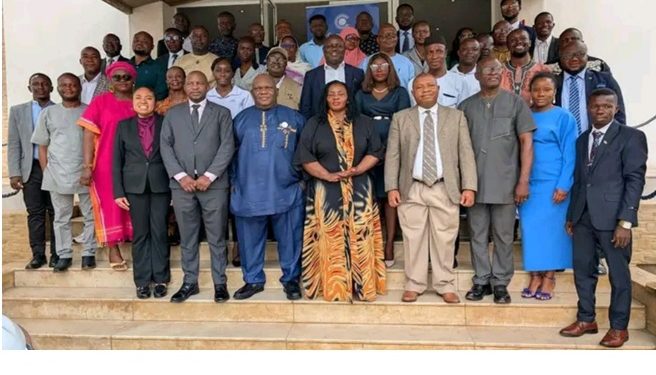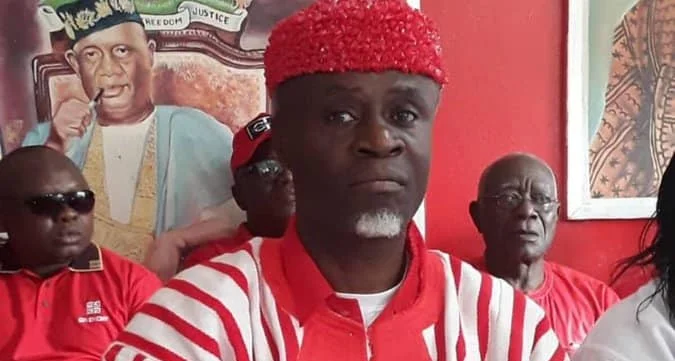By Hassan Osman Kargbo
In a bid to strengthen the country’s human rights framework, the Human Rights Commission of Sierra Leone (HRCSL), in collaboration with the Commonwealth Secretariat, launched a three-day capacity-building training on March 24, 2025.
The event, held at The Hub Hotel in Wilberforce, Freetown, aims at enhancing the ability of HRCSL commissioners, directors, senior staff, and representatives from District Human Rights Committees (DHRCs) to engage effectively with critical human rights issues.
This training, which marks an important step in the country’s ongoing commitment to upholding human rights, is designed to provide attendees with the strategic tools and knowledge to address emerging and complex human rights concerns in Sierra Leone. The HRCSL hopes to improve its overall capacity in protecting human rights across the nation by equipping its members with insights into best practices and critical principles.
Mrs. Patricia Narsu Ndanema, Chairperson of the HRCSL, expressed her appreciation for the Commonwealth Secretariat’s timely intervention, noting that the training was in response to requests made during the 2023 General Assembly of National Human Rights Institutions (GANHRI) in Geneva, as well as a series of subsequent Zoom meetings held in Freetown.
According to Mrs. Ndanema, the support from the Commonwealth Secretariat is invaluable as Sierra Leone grapples with new and emerging human rights issues, which require innovative approaches and greater collaboration.
“This training came at the right time as we navigate the complexities of emerging human rights issues,” Mrs. Ndanema remarked in her opening statement, underlining the importance of continuous learning in addressing the evolving landscape of human rights in Sierra Leone.
The training will cover five key thematic areas, addressing some of the most pressing human rights concerns globally and locally, including climate change and its impacts on human rights, migration and human trafficking, business and human rights, gender and children’s affairs, and treaty body reporting. The focus on these topics underscores the growing need to adapt human rights frameworks to contemporary challenges.
Phumlani Dlamini, Adviser at the Human Rights Unit of the Commonwealth Secretariat, spoke on behalf of the organization, stressing the importance of collaboration and capacity building in the protection and promotion of human rights. “One of the greatest strengths of the Commonwealth Secretariat is its ability to foster cooperation among member states and leverage resources and expertise through technical assistance,” Dlamini explained.
He emphasized that the ultimate goal of the training is to build the HRCSL’s capacity to effectively implement its mandate, thereby benefiting the people of Sierra Leone.
Dlamini further highlighted the role of an effective National Human Rights Institution (NHRI) in fostering a stable, peaceful, and fair society. “An effective NHRI is fundamental to peace, stability, and a free and fair society,” he said, adding that the training would enable HRCSL staff to reflect on the challenges and opportunities they face while working to sustain the culture of human rights in the country.
In addition to fostering cooperation within Sierra Leone, the training is also a platform for international exchange. The Commonwealth Secretariat has emphasized the importance of networking and sharing information, experiences, and best practices across member states.
The knowledge exchange is expected to not only benefit HRCSL staff but also strengthen the global human rights community by encouraging shared learning.
As the training progresses over the next few days, attendees will explore case studies, engage in interactive sessions, and collaborate on solutions to improve Sierra Leone’s human rights landscape. The HRCSL hopes that such efforts will significantly enhance its ability to address pressing human rights issues, improve its service delivery, and ultimately contribute to the overall advancement of human rights in the country.
To conclude, the capacity-building initiative represents a crucial opportunity for HRCSL to enhance its strategic engagement with critical human rights issues, foster cooperation, and drive meaningful change in Sierra Leone.
With the support of the Commonwealth Secretariat and a collaborative approach, HRCSL is poised to make significant strides in its mission to protect the rights and dignity of every citizen.













